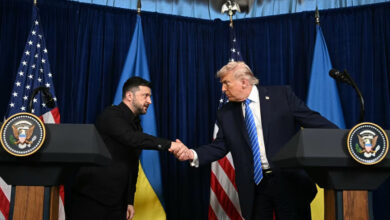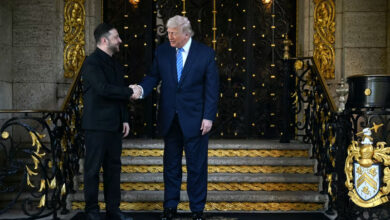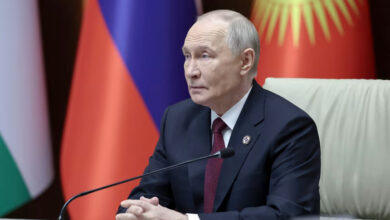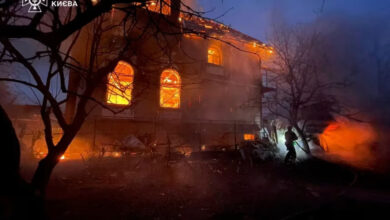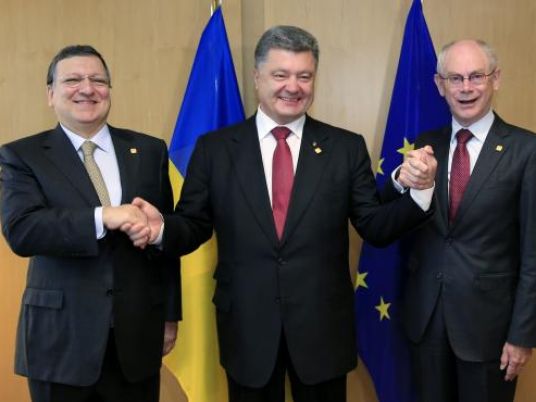
Ukraine signed on Friday an historic free-trade agreement with the European Union that has been at the heart of months of violence and upheaval in the country, drawing an immediate threat of "grave consequences" from Russia.
Georgia and Moldova signed similar deals, holding out the prospect of deep economic integration and unfettered access to the EU's 500 million citizens, but alarming Moscow which is concerned about losing influence over former Soviet republics.
All three countries have made clear their ultimate goal is membership of the bloc but Brussels, under pressure from voters weary of further EU expansion, has made no promise it will allow them in.
Ukraine's former pro-Moscow President Viktor Yanukovich turned his back on signing the EU agreement last November in favour of closer ties with Moscow, prompting months of street protests that eventually led to his fleeing the country.
Soon afterwards, Russia annexed Ukraine's Crimea region, drawing outrage and sanctions from the United States and EU, and pro-Russian separatists began an uprising in eastern Ukraine that has claimed hundreds of lives.
"Over the last months, Ukraine paid the highest possible price to make her European dreams come true," Ukrainian President Petro Poroshenko told EU leaders at a signing ceremony in Brussels, calling it the most important day for his country since independence from the crumbling Soviet Union in 1991.
Symbolically, he signed the agreement with the same pen that had been prepared for Yanukovich to sign the document last year.
Russia's Deputy Foreign Minister Grigory Karasin immediately said the signing would have "grave consequences" for Ukraine, Interfax news agency reported.
Sergei Glazyev, a senior adviser to Russian President Vladimir Putin, described Ukraine on Thursday as a fascist regime, accusing EU leaders of creating a "Nazi Frankenstein".
However, Kremlin spokesman Dmitry Peskov was quoted on Friday by Interfax as saying Glazyev’s comments "do not reflect the official point of view".
Russian response
Still, Peskov said Russia would take measures to protect its economy if it is negatively affected by the agreements, RIA news agency said.
"As soon as the implementation starts, there can be talk of some protective measures," he said. "Everything needed to protect our economy will be undertaken."
European Council President Herman Van Rompuy said there was nothing in the agreements that would harm Russia in any way.
Poroshenko urged the EU to reward Ukraine for its sacrifices by promising the country would be eligible for membership of the EU once it was ready. The pledge would "cost the EU nothing but would mean the world to my country", he said.
Van Rompuy said the agreements with the three countries were "not the final stage of our cooperation", but this fell short of the prospect of ultimate EU membership.
Moldovan Prime Minister Iurie Leanca has also set his sights on EU membership, saying on Thursday that he hoped his country would apply to join in the second half of 2015.
Russia, which fought a five-day war with Georgia in 2008, has met previous attempts by its neighbours to move closer to the EU with trade reprisals and EU officials fear the same thing could happen again.
EU officials say that, in diplomatic talks, Russia has threatened to withdraw the duty-free treatment that Ukraine currently benefits from as a member of the Commonwealth of Independent States (CIS) free trade pact.
One senior EU official called the Russian threat "deeply shocking" while another said such a move would violate the CIS agreement and World Trade Organisation rules.
If Russia imposed customs duties, it would put at risk some of Ukraine's exports, which mainly consist of base metals, grains, machinery, equipment and processed food. Ukraine sends 24 percent of its exports to Russia, worth $15 billion a year.
Russian fears
Moscow fears that an influx of EU products into Ukraine will lead Kiev to dump its own production in Russia. It is also concerned that Ukraine may re-export EU products into Russia, avoiding duties that Russia imposes to protect its own output.
Last year, Russia briefly imposed onerous customs checks at the Ukraine border and responded to Moldova's overtures to Brussels by cutting off imports of Moldovan wine.
Russian energy giant Gazprom cut off gas supplies to Kiev last week after Ukraine failed to pay its gas debts.
The EU and Ukraine had already signed parts of the agreement dealing with political cooperation in March, but the more significant economic chapters were left to be signed now, after presidential elections.
The EU exported 23.9 billion euros ($33 billion) of goods to Ukraine in 2013 and imported 13.8 billion worth, EU data shows.
As part of the deal, the EU will insist that Ukraine meet its standards on human rights and democracy, fights corruption, strengthens the rule of law and reforms its economy.

